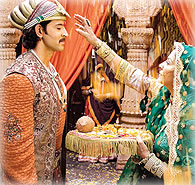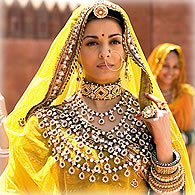Direction: Ashutosh Gowarikar
Music: A R Rahman
Production: UTV Motion Pictures
A love story, sweet and romantic. An interpretation of the rich history of a great Mughal emperor. A visual treat. Choose any one of these or all three, for Jodhaa Akbar is all in one: this is carefully crafted, meticulously executed high-class cinema. Ashuthosh Gowariker has proved his mastery over his craft beyond doubt. Handling the nitty-gritty details of history can be a bit irksome, and there are quite a few creative liberties taken in Jodhaa Akbar - not everything is straight out of the textbook. (This is told to us right at the start with an unconventional disclaimer). But then, that is the only way to keep a movie from turning into a documentary.
Jodhaa Akbar begins at a period when Humayun has just passed away and a 13-year-old Mohammad Jalaluddin is forced to ascend the throne and recapture Delhi from a barbaric looking king. Amitabh Bacchan’s baritone voice takes us through the early years of the young king till he emerges a man, with a dream of unifying all of India under the Delhi sultanate. He sets forth trying to realize the dream that generations before him have nursed. And learns that just battalions cannot win over the people of a country and that’s when one of the Rajput kings, driven to desperation by dynastic politics, offers his daughter’s hand to Jalaluddin in return for protection and amnesty. That’s where the beautiful and very different love story begins. Beautiful, because it is not love that begins in courtship and goes through romance, it is born instead out of compulsion and blooms out of companionship, respect and mutual admiration. In short, it is an arranged relationship turning romantic; the way wine matures in barrels over years.
Jodhaa Akbar shows how even an emperor is still a humble learner when it comes to love, how he evolves as a man after discovering love, how he begins to despise battle, embrace peace and become a better king. All this is captured amidst the grand and sometimes opulent settings of Mughal India, the splendor of court life, the high life of the royalty, the thrill of battle and the complex alliances and conspiracies that run rife in the politics of the empire. The first hour is all about setting the pace and building the characters. If you feel like yawning in the first hour or so, don’t feel disheartened: things pick up and never slow down from then on. That is around the time when Jodhaa and Jalaluddin start discovering their admiration for each other. From then on, right till the end the script moves at a brisk pace, not giving any room for boredom.
Moving on to the other aspects: the set design has to be definitely admired for successfully transporting us back to the 16th century. You don’t have to be a historian or have a thorough knowledge of different styles of architecture to appreciate it, it looks good and you are certain to admire it.
The settings of the Rajput palaces in Rajasthan look better and more colorful than the palatial rooms of the Mughals. Costumes are another high point of the film: Jalaluddin looks resplendent and majestic, and a lot of attention to detail has been showered on every character appearing in the film, all of whom look genuinely period. The cinematographer too has done a fine job, especially in the opening battle sequence, the scale of which really sets the tone for the film. Rahman’s score is another highlight of this movie. You don’t really notice the songs; you feel them as they waft in and out of the movie with ease, Jashn-e-bahaara stands out while Shaan-O-Shahenshah thunders with its drumbeats as Akbar’s reign grows in power and popularity.
Jodhaa Akbar

Certain scenes in the movie will remain with you long after you leave the theatre. The battle scenes, the climatic one-on-one fight, both the sword fights involving Aishwarya (she must have worked really hard at them), the ‘elephant taming’ scene and some sweet moments of veiled, subtle romance between the lead pair, whose chemistry is really excellent. Also memorable is the scene where Aishwarya herself cooks for the king. The point where Jalaluddin is adorned with the title Akbar (The Great) is a key moment.
Moving on to the cast- Hrithik has lived the role, he looks majestic and is always in command, except when in front of Aishwarya who has given one of her best performances (right up there with Hum Dil De Chuke Sanam and Guru), not to mention how good she looks. All other members of the cast add to the impact, with Sonu Sood and Ila Arun in particular doing well.
On the flip side (not really negatives), the first hour as mentioned earlier might put you off, there are certain scenes, right at the beginning and at the fag end that remind one of Troy (the Brad Pitt, Eric Bana starrer). If you are a stickler for historical accuracy, then you might find the movie a bit trying. Also, don’t expect an Akbar Nama or anything of that sort. You won’t find any of Akbar’s famous contemporaries like Birbal or Tansen in this movie, it is set in a slightly earlier period of his life; Todarmal is the only familiar name in the list of characters. You might need some patience to hear a thoroughly detailed narrative that lasts three and a half hours; people with edgy feet might get restless.

Where Jodhaa Akbar scores is that it remains true to its theme. It is a love story first and the life of an emperor next. The soul of the movie lies in the relationship, and Ashuthosh Gowariker had dealt with it superbly. It’s the kind of movie whose fate is a bit difficult to predict, but whatever the result, Ashuthosh Gowariker deserves a great round of applause for his guts and vision, which only a handful of directors in India possess. A sequel showing the rest of Akbar’s reign might not be a bad idea.
Verdict: A visual feast, an intoxicating love story
Courtesy: Behindwoods.com

No comments:
Post a Comment